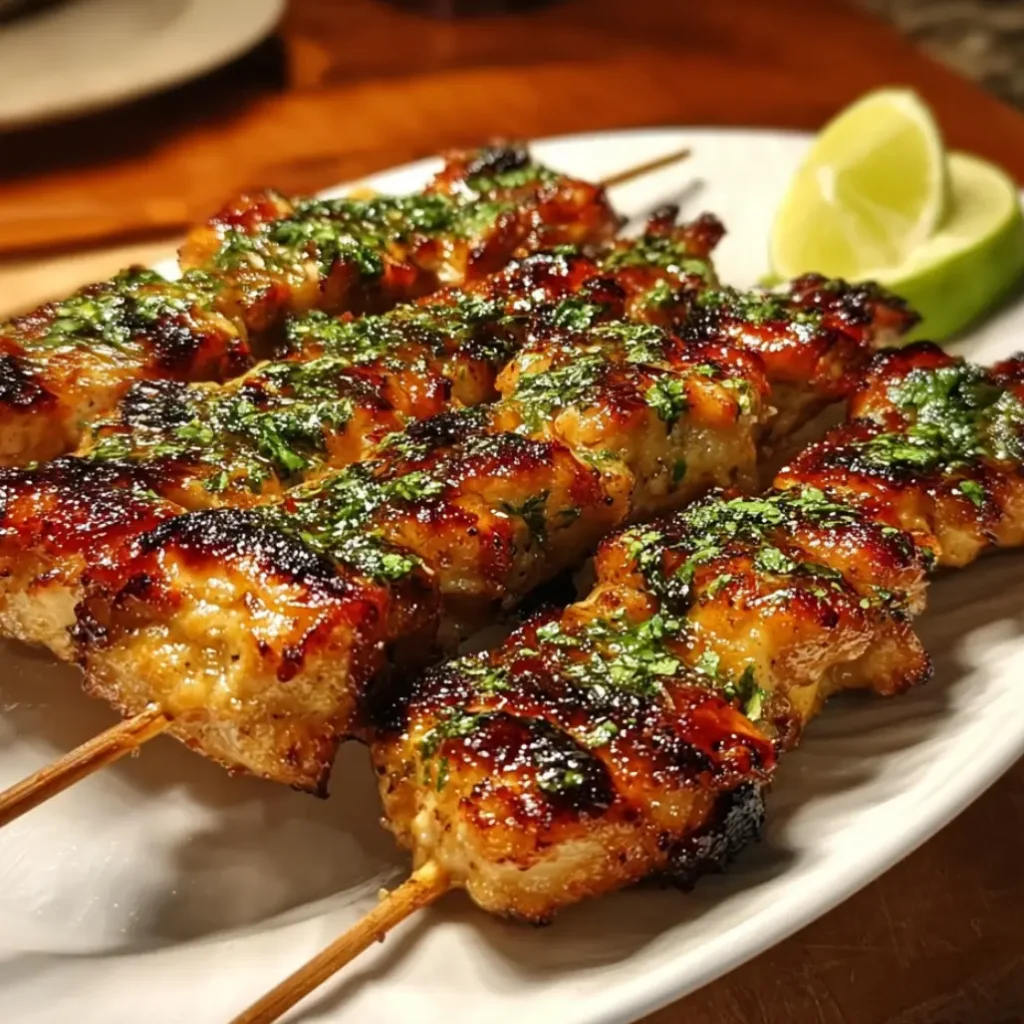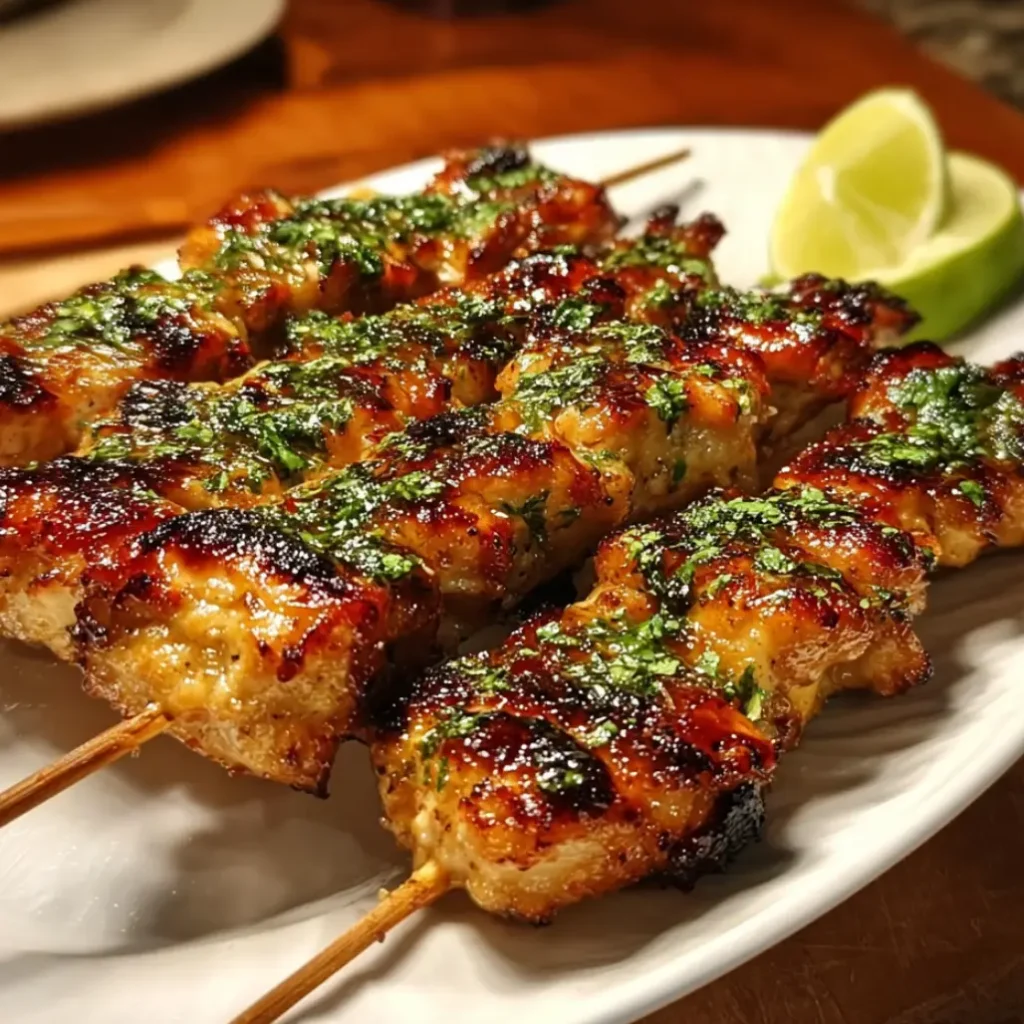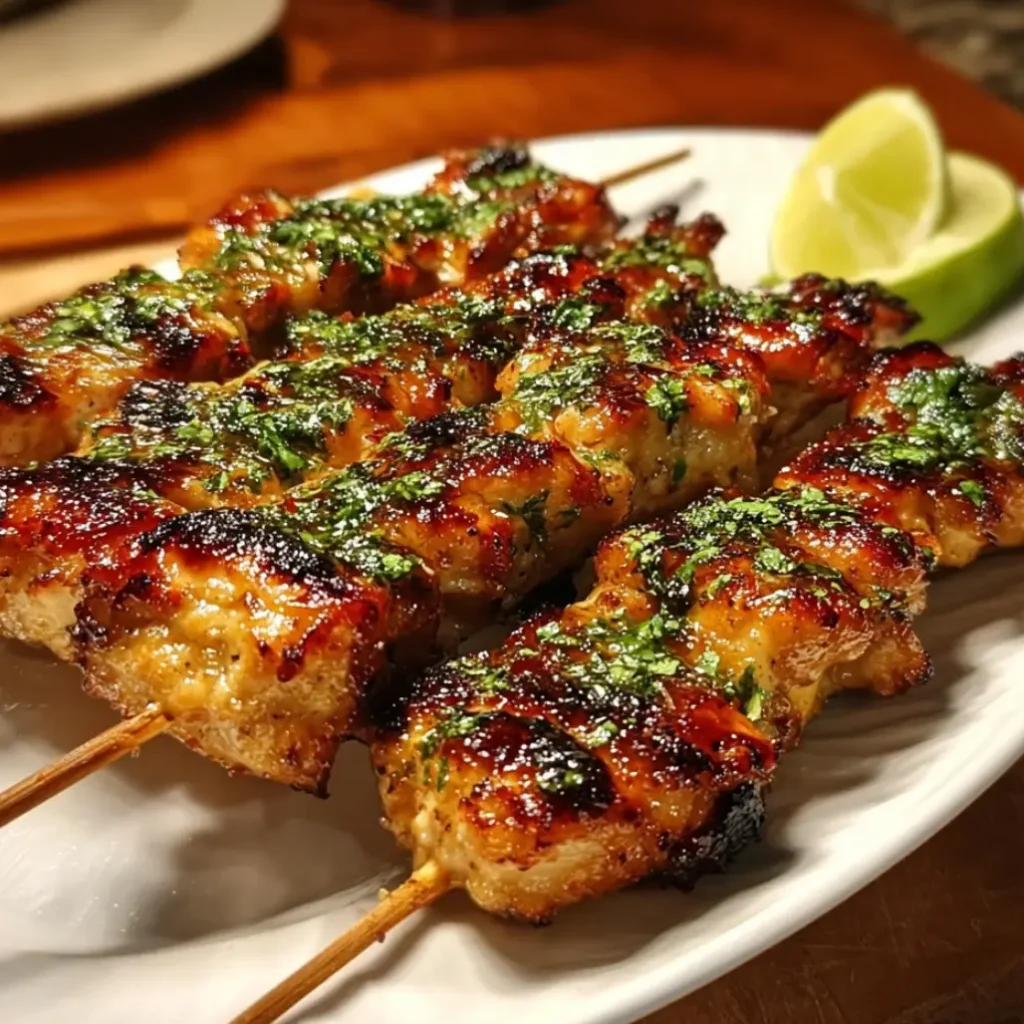| Prep Time: | 30 minutes |
|---|---|
| Cook Time: | 15 minutes |
| Total Time: | 4 hours 45 minutes |
| Serves: | 4 |
There’s something absolutely magical about the combination of creamy coconut milk, aromatic Thai spices, and perfectly grilled chicken that transforms an ordinary weeknight dinner into an extraordinary culinary adventure because these grilled Thai coconut chicken skewers deliver restaurant-quality flavors right from your own backyard grill. The tender chicken pieces absorb every drop of the luscious marinade, creating succulent bites that practically melt in your mouth while the gentle char from grilling adds that irresistible smoky complexity that makes these skewers absolutely unforgettable because the balance between sweet coconut, savory soy sauce, and warming spices creates a harmony that speaks directly to your soul.
Why These Grilled Thai Coconut Chicken Skewers Work Perfectly
These exceptional skewers succeed because they masterfully balance the richness of coconut milk with the vibrant complexity of traditional Thai flavors, creating a marinade that not only infuses incredible taste but also ensures the chicken remains incredibly moist and tender throughout the grilling process because coconut milk contains natural fats that act as a protective barrier against the high heat of the grill. The combination of curry paste, ginger, and garlic creates layers of flavor that develop and intensify during the marinating period because these aromatic compounds need time to penetrate deep into the meat fibers where they can work their transformative magic.
The skewer format provides practical advantages beyond simple presentation because threading the marinated chicken onto skewers creates uniform cooking surfaces that ensure even heat distribution and consistent results across every piece. This method also allows for easy turning and basting during the grilling process because the skewers act as handles that let you manipulate the chicken without losing precious marinade or disrupting the developing crust that adds textural contrast to each bite.
Essential Ingredients for Success
For the Chicken and Marinade:
- 2 pounds boneless, skinless chicken thighs, cut into 2-inch pieces
- 1 can full-fat coconut milk (13.5 ounces)
- 3 tablespoons Thai red curry paste
- 2 tablespoons fish sauce
- 2 tablespoons brown sugar
- 2 tablespoons soy sauce
- 1 tablespoon fresh ginger, minced
- 4 cloves garlic, minced
- 2 tablespoons vegetable oil
- 1 tablespoon lime zest
- 2 tablespoons fresh lime juice
- 1 teaspoon ground coriander
- 1/2 teaspoon turmeric powder
For the Peanut Dipping Sauce:
- 1/2 cup natural peanut butter
- 1/3 cup coconut milk
- 2 tablespoons soy sauce
- 1 tablespoon brown sugar
- 1 tablespoon fresh lime juice
- 1 teaspoon Thai red curry paste
- 1 teaspoon fresh ginger, minced
- 1 clove garlic, minced
- 1/4 teaspoon red pepper flakes
For Serving:
- Fresh cilantro leaves
- Lime wedges
- Sliced cucumber
- Wooden skewers, soaked in water for 30 minutes
The Art of Creating Perfect Grilled Thai Coconut Chicken Skewers
Mastering these skewers requires understanding that the marinade serves multiple purposes beyond simple flavoring because the coconut milk tenderizes the chicken through gentle enzymatic action while the acids from lime juice and curry paste break down tough protein fibers to create that signature melt-in-your-mouth texture. The key lies in achieving the proper balance between marinating time and ingredient proportions because too little time results in surface-level flavoring while too much can make the chicken mushy from over-tenderizing.
Temperature control during grilling becomes crucial for success because chicken thighs contain enough natural fat to remain juicy even when fully cooked, but they require consistent medium-high heat to develop the beautiful caramelization that creates visual appeal and concentrated flavors. The coconut milk in the marinade contains natural sugars that caramelize beautifully under direct heat, creating those coveted golden-brown edges that provide textural contrast against the tender interior because this Maillard reaction develops complex flavors that complement rather than compete with the aromatic spice blend.
Step-by-Step Instructions for Excellence
Step 1: Prepare the Aromatic Marinade Whisk together coconut milk, Thai red curry paste, fish sauce, brown sugar, soy sauce, minced ginger, minced garlic, vegetable oil, lime zest, lime juice, ground coriander, and turmeric powder in a large mixing bowl until the mixture achieves complete smoothness because any lumps of curry paste will create uneven flavor distribution that affects the final taste. The marinade should have a beautiful golden color with visible flecks of ginger and garlic that promise the complex flavors to come because proper integration of these ingredients creates the foundation for exceptional results.
Professional Tip: Allow the marinade to sit for 10 minutes before adding the chicken because this resting time allows the curry paste to fully dissolve and the flavors to begin melding together for more cohesive taste development.
Key Points: The finished marinade should coat the back of a spoon lightly and smell intensely aromatic with no harsh alcohol notes from the fish sauce, indicating proper balance and integration of all components.
Step 2: Marinate the Chicken for Maximum Flavor Add the chicken thigh pieces to the marinade, tossing thoroughly to ensure every piece receives complete coating because uneven distribution leads to inconsistent flavoring that affects the overall eating experience. Cover the bowl tightly with plastic wrap and refrigerate for at least 4 hours, though overnight marination produces even more intense flavors because extended contact time allows the aromatic compounds to penetrate deeper into the meat fibers where they create lasting impact.
Professional Tip: Turn the chicken pieces every few hours during marination because this ensures even exposure to the acidic components and prevents any pieces from becoming over-tenderized while others remain under-seasoned.
Key Points: Properly marinated chicken will appear slightly lighter in color and feel noticeably more tender when gently pressed, indicating that the enzymatic tenderizing process has been successful.
Step 3: Create the Complementary Peanut Sauce Combine peanut butter, coconut milk, soy sauce, brown sugar, lime juice, curry paste, minced ginger, minced garlic, and red pepper flakes in a medium saucepan over medium heat, whisking constantly until the mixture becomes completely smooth because lumpy sauce detracts from the elegant presentation and eating experience. Cook the sauce for 3-4 minutes while stirring continuously until it thickens slightly and develops a glossy appearance because proper cooking eliminates any raw garlic bite while intensifying the overall flavor profile.
Professional Tip: Taste the sauce and adjust the balance between sweet, salty, and spicy elements because personal preferences vary, and the sauce should complement rather than overpower the grilled chicken flavors.
Key Points: The finished sauce should flow smoothly from a spoon while maintaining enough body to cling nicely to the chicken, with a balanced flavor that showcases peanut richness without overwhelming the palate.
Step 4: Prepare the Grill for Optimal Cooking Preheat your grill to medium-high heat, ensuring the grates are clean and well-oiled to prevent sticking because chicken skin and marinade can easily adhere to hot metal surfaces if proper preparation steps are skipped. Set up a two-zone cooking area if using a charcoal grill, with direct high heat for initial searing and indirect medium heat for finishing because this technique prevents burning while ensuring thorough cooking throughout each piece.
Professional Tip: Test the grill temperature by holding your hand 5 inches above the grates; you should be able to keep it there for 3-4 seconds for medium-high heat because this simple method provides more accuracy than built-in thermometers for surface cooking temperature.
Key Points: Properly preheated grill grates will create immediate sizzling when the chicken makes contact, indicating sufficient heat for proper searing and flavor development through caramelization.
Step 5: Thread the Chicken onto Skewers Remove the marinated chicken from the refrigerator and thread the pieces onto the soaked wooden skewers, leaving small gaps between pieces to ensure even heat circulation because overcrowded skewers cook unevenly and prevent proper browning on all surfaces. Reserve about 1/4 cup of the marinade for basting during grilling because this adds extra flavor layers and helps maintain moisture throughout the cooking process.
Professional Tip: Thread the chicken pieces so that they lay flat against the grill grates because this maximizes surface contact for even cooking and better grill marks that enhance both visual appeal and flavor development.
Key Points: Properly skewered chicken should feel secure but not compressed, with enough space between pieces to allow heat circulation while maintaining structural integrity during the turning process.
Step 6: Grill to Golden Perfection Place the skewers on the preheated grill and cook for 5-6 minutes on the first side without moving them because premature turning prevents proper searing and grill mark development that adds both visual appeal and concentrated flavors. Brush the top surfaces with reserved marinade during cooking because this creates additional flavor layers while helping maintain moisture in the high-heat environment.
Professional Tip: Watch for the edges of the chicken to turn golden brown and slightly charred because these visual cues indicate proper caramelization of the natural sugars in the marinade, which creates complex flavors that define exceptional grilled chicken.
Key Points: The first side is ready to turn when the chicken releases easily from the grill grates and shows attractive grill marks, indicating that sufficient browning has occurred for optimal flavor and texture development.
Step 7: Complete the Cooking Process Turn the skewers carefully using tongs and cook for an additional 4-5 minutes on the second side, continuing to baste with the reserved marinade because this maintains the moisture barrier that prevents drying while building flavor complexity through multiple applications. Check for doneness by cutting into the thickest piece to ensure no pink remains because food safety requires complete cooking while maintaining the juicy texture that makes these skewers so appealing.
Professional Tip: Use an instant-read thermometer to verify that the internal temperature reaches 165°F because this ensures food safety while preventing overcooking that can result in dry, tough chicken despite the protective marinade.
Key Points: Fully cooked grilled Thai coconut chicken skewers should have golden-brown surfaces with slightly charred edges and clear juices running from the meat when pierced with a knife, indicating proper doneness and moisture retention.
Step 8: Rest and Serve with Style Remove the finished skewers from the grill and allow them to rest for 3-4 minutes before serving because this brief resting period allows the juices to redistribute throughout the meat fibers for optimal tenderness and flavor distribution. Arrange the skewers on a serving platter and garnish with fresh cilantro leaves and lime wedges because these fresh elements provide color contrast and complementary flavors that enhance the overall presentation.
Professional Tip: Warm the peanut sauce gently before serving because room temperature or warm sauce provides better flavor release and easier drizzling consistency than cold sauce that may have thickened during storage.
Key Points: The finished grilled Thai coconut chicken skewers should be served immediately while still warm to maximize the contrast between the hot, smoky chicken and the cool, fresh garnishes that complete the flavor experience.
Professional Tips for Consistent Success
Understanding the science behind successful marination ensures consistent results every time you prepare these grilled Thai coconut chicken skewers because the chemical reactions that create tenderness and flavor penetration follow predictable patterns when proper techniques are applied. Chicken thighs work better than breasts for this recipe because their higher fat content and more robust texture withstand the acidic marinade while remaining juicy throughout the grilling process because lean breast meat can become dry and stringy when exposed to extended marination and high heat.
Soaking wooden skewers prevents burning and splintering during grilling because dry wood ignites easily under direct heat, while pre-soaked skewers char slowly and maintain structural integrity throughout the cooking process. For those interested in exploring complementary dishes, consider browsing our collection of perfect sides that pair beautifully with these aromatic skewers, or discover inspiration in our snacks appetizers section for creating complete Thai-inspired meal experiences.
The key to exceptional grill marks lies in patience and proper heat management because moving the skewers too frequently prevents the Maillard reaction that creates both visual appeal and complex flavors, while consistent medium-high heat ensures even cooking without burning the sugars in the coconut milk marinade.
Creative Variations to Explore
Transform these basic grilled Thai coconut chicken skewers into exciting new variations by incorporating different proteins or adjusting the spice profile to match various taste preferences and dietary requirements because the fundamental marinade technique adapts beautifully to numerous modifications. Consider substituting firm fish like mahi-mahi or salmon for the chicken because these proteins absorb the coconut marinade beautifully while requiring shorter cooking times that prevent overcooking and dryness.
Vegetarian versions work wonderfully using extra-firm tofu or tempeh because these plant-based proteins readily absorb marinades while providing satisfying texture and protein content that appeals to diverse dietary preferences. For those who enjoy more heat, increase the curry paste or add fresh chilies to the marinade because Thai cuisine traditionally offers various spice levels to accommodate different tolerance levels and regional preferences.
Fruit additions create interesting flavor complexity because diced pineapple or mango can be threaded onto separate skewers and grilled alongside the chicken, providing sweet contrast that complements the savory marinade elements. You might also explore our flavored dips marinades collection for additional sauce variations that could accompany these skewers in creative presentations.
Perfect Pairing Ideas for Complete Meals
These aromatic grilled Thai coconut chicken skewers pair beautifully with complementary dishes that either echo the Southeast Asian flavor profile or provide contrasting textures and temperatures because successful menu planning considers how different elements work together to create satisfying, balanced meal experiences. Jasmine rice serves as the perfect neutral base because its subtle floral aroma and tender texture allow the complex skewer flavors to shine while providing satisfying substance that rounds out the meal.
Fresh cucumber salad with rice vinegar dressing provides cooling contrast against the warm, spiced chicken because crisp vegetables and acidic dressing cleanse the palate between rich, flavorful bites while adding textural variety that prevents monotony. Thai-style coleslaw with lime dressing offers similar benefits while adding colorful visual appeal that makes the entire presentation more attractive and appetizing.
For beverages, consider Thai iced tea or coconut water because these traditional drinks complement the coconut flavors in the marinade while providing refreshing contrast to the grilled elements. You can also explore our refreshing beverages section for additional drink ideas that would create cohesive flavor themes throughout your meal planning.
Discover More Thai-Inspired Delights
Expand your Southeast Asian cooking repertoire by exploring related recipes that share similar techniques and flavor profiles with these grilled Thai coconut chicken skewers because mastering one authentic dish often provides the foundation for understanding an entire cuisine’s approach to balancing sweet, salty, sour, and spicy elements. Thai green curry uses similar coconut milk and curry paste combinations in a different format, while pad thai incorporates comparable sweet and savory balance in noodle form.
Consider preparing Thai-style spring rolls as appetizers because they showcase fresh herbs and vegetables that complement the rich, grilled flavors while providing lighter contrast that prepares the palate for the main course. Our salads collection includes several Asian-inspired options that could serve as refreshing accompaniments to these substantial skewers.
For dessert connections, explore our dessert recipes section for coconut-based sweets that would create a cohesive flavor theme throughout your meal because coconut appears in many traditional Thai desserts that provide satisfying conclusions to spice-forward meals. Building these connections between recipes helps develop confidence in menu planning while ensuring that every element of your dining experience feels intentionally coordinated and professionally executed.
Storage and Make-Ahead Guidelines
Proper storage techniques ensure that your grilled Thai coconut chicken skewers maintain their exceptional flavor and texture for several days after preparation because understanding food safety principles allows you to enjoy these complex flavors beyond the initial cooking session. Cooked skewers can be stored in the refrigerator for up to 4 days when properly wrapped in airtight containers because this prevents moisture loss and contamination while maintaining food safety standards.
The marinade components can be prepared up to one week in advance and stored separately in the refrigerator because this make-ahead approach reduces day-of preparation time while allowing flavors to develop and meld for even more complex taste profiles. Raw marinated chicken should be used within 24 hours of preparation because extended exposure to acidic ingredients can alter the protein structure in undesirable ways that affect texture.
For longer storage, cooked chicken can be frozen for up to 3 months when properly wrapped and labeled because freezing halts bacterial growth while preserving most of the flavor and nutritional qualities. Thaw frozen chicken slowly in the refrigerator overnight before reheating because rapid thawing can create texture problems and food safety concerns that affect the final eating experience.
The Science Behind Exceptional Results
Understanding the scientific principles that make these grilled Thai coconut chicken skewers so successful empowers you to achieve consistent results while troubleshooting any issues that might arise during preparation because cooking is fundamentally about controlling chemical and physical reactions that transform raw ingredients into delicious finished dishes. The coconut milk contains natural emulsifiers that help the marinade penetrate deeply into the chicken while providing fat molecules that create moisture barriers during high-heat cooking.
Curry paste contains compounds that break down protein structures through enzymatic action, creating the tender texture that defines exceptional grilled chicken because these traditional fermented ingredients have been optimized over centuries to achieve specific culinary effects. The combination of acids from lime juice and enzymes from ginger and garlic work synergistically to tenderize the meat while developing complex flavors that could not be achieved through single ingredients alone.
Heat application during grilling creates the Maillard reaction between proteins and sugars in the marinade, producing hundreds of flavor compounds that contribute to the complex taste profile while creating the appealing golden-brown color that signals proper cooking because this chemical transformation is essential for developing the deep, satisfying flavors that make grilled foods so appealing.
Troubleshooting Common Issues
Even experienced cooks occasionally encounter challenges when preparing complex dishes like these grilled Thai coconut chicken skewers, but understanding the common problems and their solutions helps ensure success every time because most issues stem from easily corrected technique errors rather than fundamental recipe flaws. Dry chicken usually results from overcooking or using lean breast meat instead of thighs because breast meat lacks the natural fat content that maintains moisture during high-heat cooking methods.
If your marinade seems too thick or thin, adjust the consistency by adding small amounts of coconut milk or lime juice respectively because proper marinade texture ensures even coating and penetration while preventing dripping that can cause flare-ups during grilling. Skewers that fall apart during cooking indicate either insufficient threading tension or chicken pieces that are too small because proper skewering technique requires firm threading while maintaining piece integrity.
Uneven cooking often results from overcrowded grill grates or inconsistent heat zones because proper spacing allows adequate air circulation while consistent temperatures ensure uniform doneness across all skewers. If the exterior browns too quickly before the interior cooks through, reduce the heat and consider finishing the skewers in indirect heat zones because this technique prevents burning while ensuring food safety through complete cooking.
Additional Asian-Inspired Inspirations
Continue your exploration of Southeast Asian flavors by discovering recipes that build upon the techniques and flavor profiles you’ve mastered with these grilled Thai coconut chicken skewers because developing expertise in one cuisine often opens doors to understanding related cooking traditions and ingredient applications. Consider exploring Vietnamese lemongrass chicken or Malaysian satay because these dishes share similar grilling techniques while showcasing different spice combinations and serving styles.
Indonesian gado-gado utilizes comparable peanut sauce preparations in salad format, while Thai larb incorporates similar herbs and seasonings in ground meat preparations that provide different textural experiences using familiar flavor foundations. You might also consider exploring our breakfast favorites section for morning dishes that incorporate similar warming spices and coconut elements in different meal contexts.
Regional curry variations offer opportunities to use similar ingredient combinations in braised or stewed preparations because understanding how different cooking methods affect the same flavor bases helps develop broader culinary confidence and creativity. These connections between techniques and ingredients help build intuitive cooking skills that allow for improvisation and personal adaptation of traditional recipes to match individual preferences and available ingredients.
Conclusion
These grilled Thai coconut chicken skewers represent the perfect intersection of exotic flavors and accessible cooking techniques because they deliver restaurant-quality results using ingredients that are readily available in most grocery stores while requiring no special equipment beyond a basic grill and wooden skewers. The complex interplay between creamy coconut milk, aromatic curry paste, and warming spices creates a marinade that transforms simple chicken thighs into an extraordinary culinary experience that will impress family and guests alike because authentic Thai flavors have the power to transport diners to distant places through the universal language of exceptional food.
Mastering this recipe builds confidence for exploring other Southeast Asian dishes because the fundamental techniques of marination, spice balancing, and grilling translate across many different recipes and cooking traditions that share similar approaches to creating harmony between sweet, salty, sour, and spicy elements. The satisfaction of creating these complex flavors in your own kitchen extends beyond the immediate pleasure of eating because cooking connects us to global food traditions while providing the practical skills and knowledge that enhance everyday meal preparation.
Whether you’re planning a special dinner party, looking for exciting weeknight meal options, or simply wanting to expand your grilling repertoire, these grilled Thai coconut chicken skewers offer the perfect combination of exotic appeal and practical execution because great cooking should be both adventurous and achievable, allowing home cooks to explore new flavors while building confidence in their culinary abilities through successful, delicious results that create lasting memories around the dining table.










